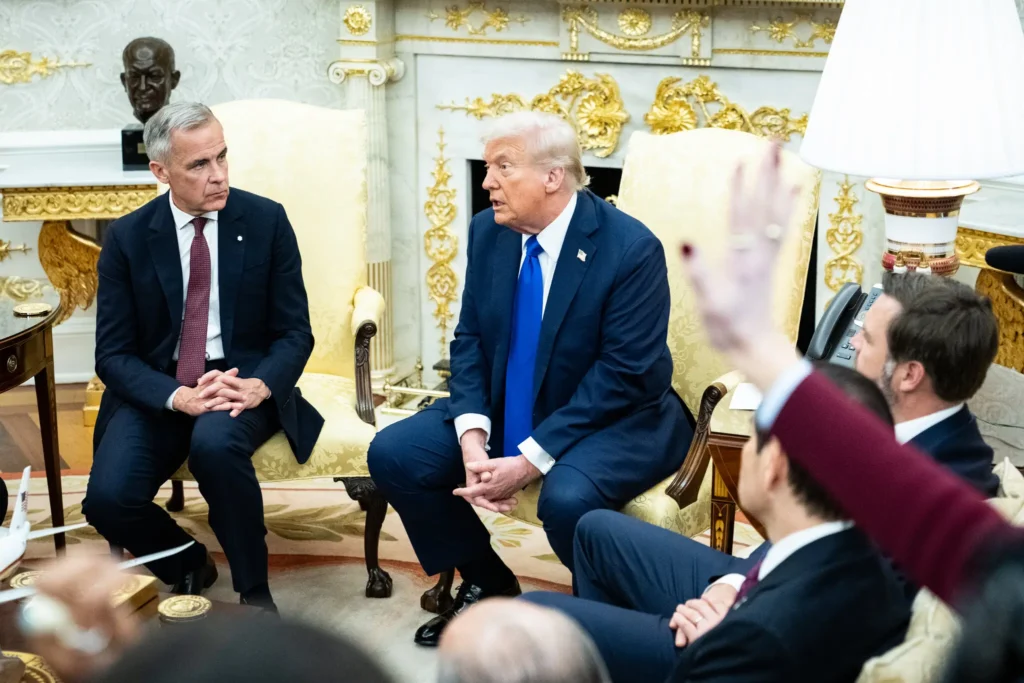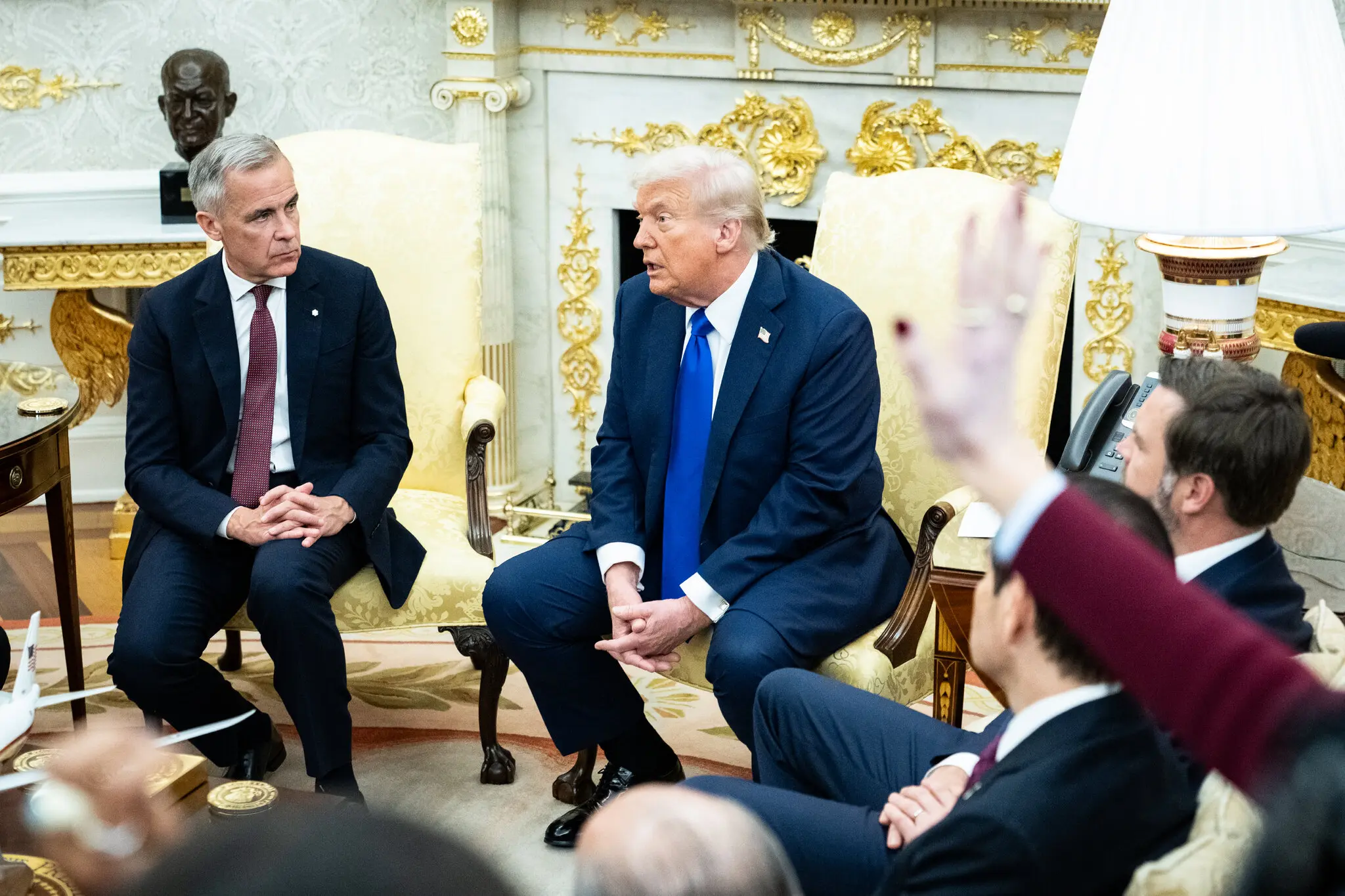WASHINGTON — President Donald Trump announced late Thursday that his administration is ending all trade negotiations with Canada, escalating tensions with one of America’s closest economic partners.
The announcement came in a post on Truth Social, where Trump accused the Canadian government of running a “fraudulent” advertisement that misused the voice of former President Ronald Reagan to criticize tariffs. Trump called the ad “dishonest” and an “attack on U.S. economic sovereignty.”
“TARIFFS ARE VERY IMPORTANT TO THE NATIONAL SECURITY, AND ECONOMY, OF THE U.S.A.,” Trump wrote. “Based on their egregious behavior, ALL TRADE NEGOTIATIONS WITH CANADA ARE HEREBY TERMINATED.”

Trade Negotiations With Canada
The move immediately shook the already uneasy trade relationship between Washington and Ottawa. Canada remains the United States’ second-largest trading partner, with hundreds of billions of dollars in goods crossing the border every year. Both nations had been preparing for a review of the U.S.–Mexico–Canada Agreement (USMCA) scheduled for completion next summer.
The Reagan Ad Controversy
At the center of the dispute is a television ad commissioned by the government of Ontario, Canada’s most populous province. According to Ontario officials, the ad cost about 75 million Canadian dollars (roughly $53.5 million USD) and uses a 1987 audio clip of President Ronald Reagan warning against tariffs.
“When someone says, ‘Let’s impose tariffs on foreign imports,’ it looks like they’re doing the patriotic thing by protecting American products,” Reagan’s voice says in the ad. “But markets shrink and collapse, industries shut down, and millions of people lose their jobs.”
The ad began airing this week on several U.S. networks, including Bloomberg and Newsmax, and was expected to expand to other American channels in the coming weeks. Ontario officials claimed the campaign was meant to highlight the global risks of trade barriers — not to interfere in U.S. politics.
However, sources close to the Ronald Reagan Presidential Foundation told reporters the foundation was never contacted for permission to use Reagan’s words or likeness. The foundation is said to be “reviewing legal options” in response.
Reactions From Ottawa and Ontario
Neither Canadian Prime Minister Mark Carney nor Ontario Premier Doug Ford issued immediate statements following Trump’s post. Officials in Ottawa privately described the move as “unfortunate and unexpected,” suggesting they were caught off guard by the abrupt halt.
Economists and trade analysts across North America expressed concern over the timing. With the USMCA review approaching, they say Trump’s decision could upend months of planning by trade negotiators and unsettle industries dependent on cross-border supply chains — especially automotive, agriculture, and energy sectors.
“This isn’t just symbolic,” said one Washington-based trade consultant. “If negotiations truly stop, it will ripple through both economies almost immediately. We’re talking about billions in exports and jobs on both sides of the border.”
A Strained Partnership
Tensions between Trump and Canadian leaders have flared repeatedly over the years. During his previous term, Trump imposed double-digit tariffs on Canadian steel and aluminum, arguing they posed national security risks. He also once joked that Canada should become the 51st U.S. state, a remark that sparked sharp criticism in Ottawa.
Analysts believe this latest episode could mark another turning point in U.S.–Canada relations, particularly if Trump doubles down on his “America First” trade agenda heading into next year’s election cycle.
“Canada is a crucial partner,” said a former U.S. trade official. “But Trump’s view of trade is transactional — it’s about leverage, not diplomacy. He believes tariffs protect American workers, regardless of who gets offended.”
What Happens Next
So far, the White House has not released any official statement clarifying whether the suspension of talks is temporary or permanent. U.S. Trade Representative offices declined to comment.
Canadian trade officials are reportedly convening in Ottawa to assess next steps, including whether to continue informal communication channels with Washington. A spokesperson for the Canadian Embassy in Washington said Canada “remains committed to fair and open trade but will always defend its right to express its own views.”
Meanwhile, business groups on both sides of the border urged restraint. The U.S. Chamber of Commerce warned that a breakdown in trade dialogue could “disrupt industries, increase prices, and weaken North American competitiveness.”
President Trump’s decision underscores how fragile North America’s economic ties remain. A single political dispute — even over a 30-year-old speech — has the potential to derail a trillion-dollar trading relationship.
For now, Trump’s message is unmistakable: tariffs and trade policy are central to his vision of national security, and any attempt to challenge that narrative — even indirectly — won’t go unanswered.
Whether this standoff is temporary political theater or the beginning of a deeper trade rift, it sends a clear signal to Ottawa: under Trump, tariffs aren’t just economics — they’re strategy.

